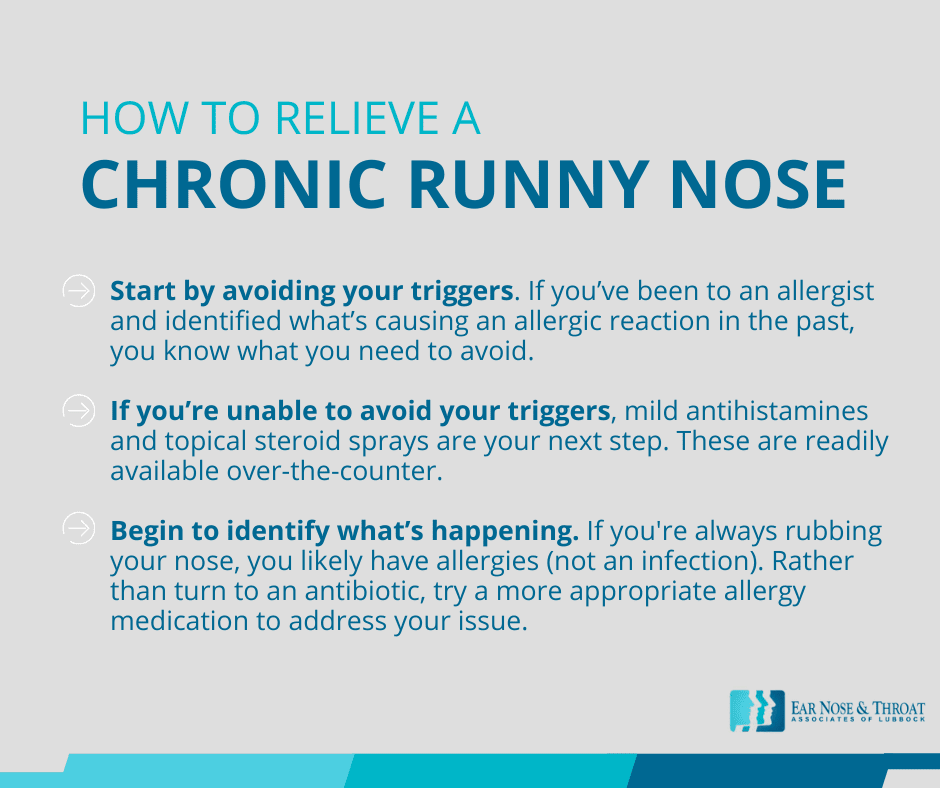Chronic Runny Nose: At What Point Should You Worry?

You shouldn’t have to deal with a constantly runny nose.
Sure, it’s a minor inconvenience compared to other health issues. But when the snot won’t stop, a chronic runny nose can be extremely frustrating. You constantly have to sniff in, clear your throat, blow your nose, and keep a tissue on hand to manage the drainage.
Some people also deal with a sore throat, itchy eyes, and an itchy nose.
When kids experience a constantly runny nose, they start practicing the “allergic salute.” We’ve all seen it – it’s when they compulsively catch their nasal drainage with the back of their hand. Some kids wipe their noses so often, they actually create a crease in the nose.
Fortunately, we have ways to help eliminate the drainage — for kids and adults. If you’re dealing with a chronic runny nose, we’ll identify the source of the problem and find a treatment that puts a stop to it.
Causes of a Chronic Runny Nose
A runny nose can be a symptom of infections or allergies. When you discuss your symptoms with an ENT, they may use words like rhinorrhea or rhinitis to describe what you’re experiencing. Let’s start breaking down the words:
Rhino: Nose
Rhea: Drainage
Itis: Infection
Rhinorrhea, or nasal drainage, describes all mucous drainage from the nose — allergies or infection.
Clear drainage typically is triggered by allergies. When environmental elements like dust, cigarette smoke, perfume, or pollen irritate your nasal cells, your immune system responds with drainage. Essentially, as your body tries to attack the irritants, it produces mucous and results in a runny nose.
Colored drainage usually indicates infection and could also be called rhinitis. Infections occur when your nasal cavity becomes infected with bacteria or a virus. As your body tries to fight the infection, it produces colored mucous.
While most drainage indicates infection or allergies, ENTs are also alert to rare cases of CSF rhinorrhea. Cerebrospinal fluid rhinorrhea occurs when people spontaneously develop drainage of brain fluid through the nose. Although extremely rare, your ENT will check for this as well and follow a specific course of treatment if they suspect it.
Treatments for a Runny Nose
Depending on the cause of the drainage, we then progress with a specific treatment. The main treatment for either allergies or infection is medicine.
For allergies, the occasional dose of a mild antihistamine (Claritin, Zyrtec, Allegra) helps block the body’s allergic response. But we don’t recommend taking these medications daily, as these medicines can overly dry out the sinuses. If you dry your secretions too much, you’ll actually promote sinus infection. We want our patients to gain relief from the drainage without interfering with the body’s ability to flush out the irritants when necessary.
If an occasional antihistamine isn’t enough, we add a topical steroid spray to the medication regimen. Until recently, these were only available by prescription, but very effective medicines like Flonase and Nasacort are now available over-the-counter. When patients use these medications during allergy season, they effectively block the allergic reaction. These topical steroid sprays deliver great results without putting the stress of steroids on the rest of your body.
Both antihistamines and topical steroid sprays can be used for adults and children (under the direction of a doctor).
For infections, an ENT will work to identify what caused the infection. If the infection was induced by allergies, they’ll not only treat the infection but work to help you manage allergies to prevent a recurrence. Additionally, some of the same medications that help manage allergies may also help reduce the symptoms of infection until it clears.

How to Relieve A Chronic Runny Nose… Starting Now
You don’t have to wait for a doctor’s visit to deal with your runny nose. You can begin managing your symptoms at home immediately.
Start by avoiding your triggers. If you’ve been to an allergist and identified what’s causing an allergic reaction in the past, you know what you need to avoid. It could be a pet or a type of pollen. Avoiding it is the first step.
If you’re unable to avoid your triggers (or unable to avoid all of them!), mild antihistamines and topical steroid sprays are your next step. These are readily available over-the-counter.
You can also begin to identify what’s happening with your child. If your child is always rubbing their nose, they likely have allergies (not an infection). Rather than turn to an antibiotic, try a more appropriate allergy medication to address their issue. Consider using children’s forms of the medications listed above — even the topical steroid sprays.
But don’t overdo it. Remember, a runny nose isn’t bad.
In fact, some drainage is good. For the nose to stay healthy, it needs moisture. A daily dose of an antihistamine can dry out the nasal cavity too much. If these medications seem too strong, try saline as a way to moisturize (and decongest) the sinuses without drying them out.
When to call the ENT
It’s smart to call an ENT if you think you may have a problem — then you’ll learn how to most appropriately treat it.
Is it allergies?
Do you have an anatomic issue like a deviated septum, polyps, or swollen turbinates?
Are you dealing with a chronic sinus infection?
We’ll help you figure out what’s causing the issue so we know the best treatment. If medications don’t fully address your problem, we also have procedural treatments to help alleviate chronic runny nose like Clarifix and RhinAer. Clarifix, a minimally invasive treatment for chronic drainage, targets the source of the symptoms using liquid nitrogen to deactivate some of the nerves that carry the impulses for the nose to swell, drain, congest, and run. Similarly, RhinAer, uses radiofrequency technology to target the same nerves and help reduce your runny nose.
If you’re dealing with an anatomic issue, we have other procedures to open the nose and help you breathe better. Depending on the issue, we can straighten the septum or shrink turbinates to open the passageways. If you have obstructions like these in the nose, you can’t tolerate even mild allergies.
There’s no need to keep carrying tissues or compulsively have to blow, sniff, or cough to manage your drainage. If you’re dealing with a chronic runny nose, an ENT can find a solution to provide you relief.
Dr. Scolaro is a board-certified Otolaryngologist servicing the South Plains area. He has been practicing in Lubbock since 1990 and has earned a reputation as a skilled and experienced surgeon. He currently serves as the Medical Director for Covenant High Plains Surgery Center campuses, is a member of Covenant Health Partners and is an adjunct faculty professor for Texas Tech University Health Sciences Center School of Medicine. Learn more about Dr. Scolaro.
Categories:








